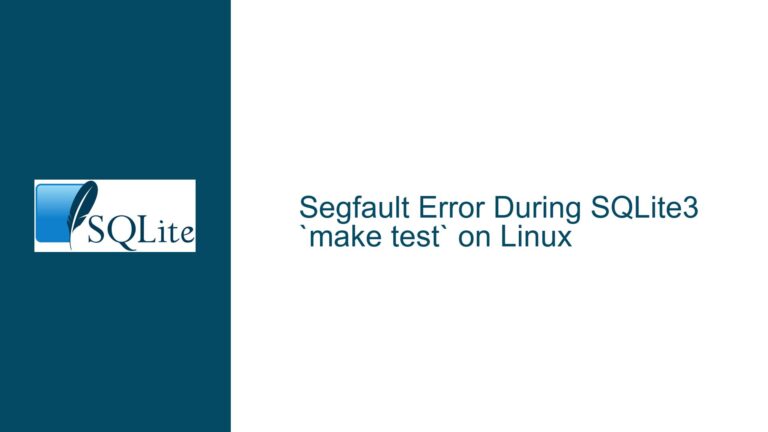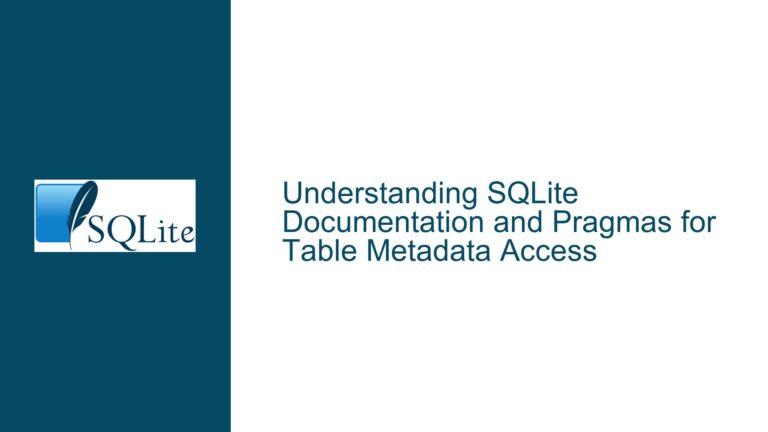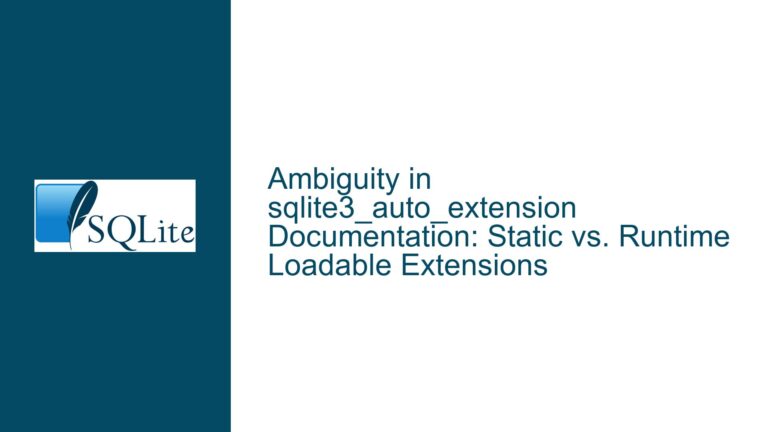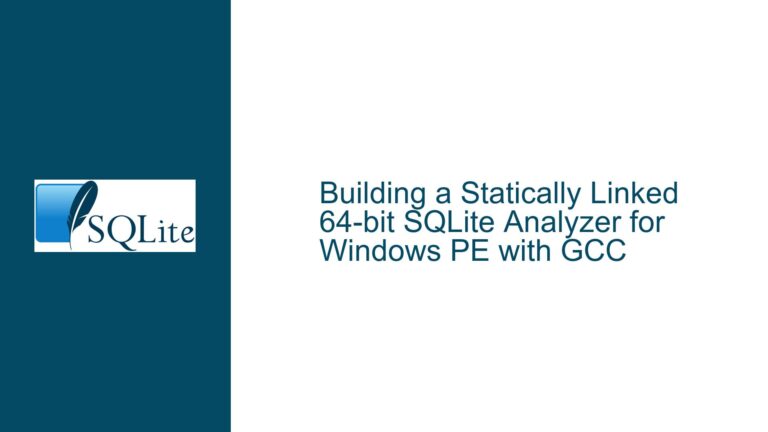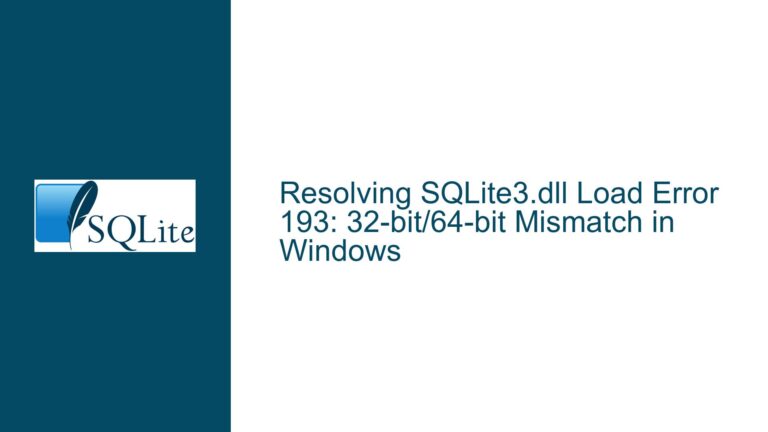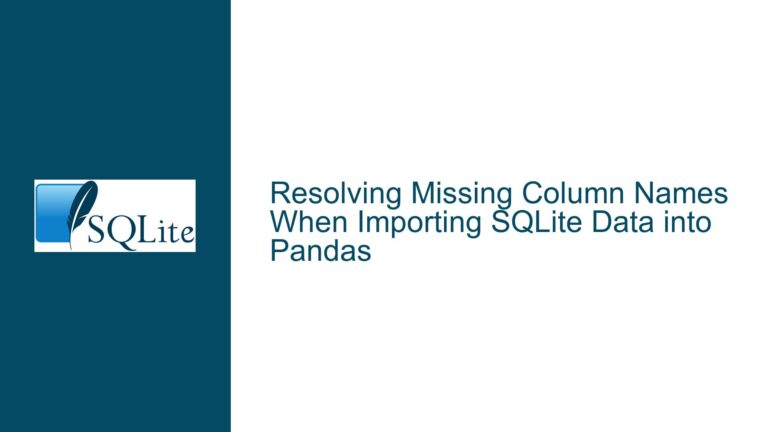Android SQLite JNI Crash in WAL Mode Despite Disabling Write-Ahead Logging
Database Transaction Commit Failure in WAL Mode After Explicit Disabling
The core issue revolves around an Android application experiencing a native crash during SQLite transaction commits, specifically within Write-Ahead Logging (WAL) subsystem functions such as walIndexAppend, despite the developer explicitly disabling WAL mode via SQLiteDatabase.disableWriteAheadLogging(). The crash occurs in Android 9 (API 28) devices, with stack traces pointing to low-level SQLite functions tied to WAL index management and pager operations. This indicates that the database connection is still operating in WAL mode even after the attempted configuration change, leading to memory access violations or concurrency conflicts during transaction commits.
Misalignment Between Configured Journal Mode and Active Database State
The primary challenge stems from a mismatch between the developer’s intended journal mode (non-WAL) and the actual runtime state of the SQLite database. While disableWriteAheadLogging() is invoked during onConfigure(), this does not guarantee immediate or complete deactivation of WAL for all database connections. SQLite’s WAL mode involves persistent configuration parameters, shared memory structures (the WAL index), and file-level metadata. If any of these components remain in a WAL state due to incomplete cleanup, residual connections, or file-level configuration locks, subsequent transactions may erroneously trigger WAL-specific code paths, leading to crashes.
Key factors contributing to this misalignment include:
- Delayed or Partial WAL Deactivation: The
disableWriteAheadLogging()method does not forcibly terminate active WAL transactions or connections. If a database connection is already in WAL mode, disabling it may not take effect until the next database open or after all connections are closed. - Residual WAL Files and Shared Memory: SQLite’s WAL mode relies on auxiliary files (
.wal,.shm) and shared memory mappings. If these files are not deleted or if their state is corrupted, subsequent operations may attempt to use them even after WAL is disabled. - Concurrent Database Access: Background threads or asynchronous tasks holding open database connections in WAL mode can prevent the journal mode from switching. SQLite requires all connections to close before changing the journal mode via
PRAGMA journal_mode. - Incorrect Configuration Order: The
onConfigure()method is called during database setup but may not execute before other initialization steps, such as opening connections or starting transactions. If WAL mode is disabled after connections are already active, the change may not propagate.
Resolving WAL Mode Conflicts and Ensuring Journal Mode Consistency
Step 1: Validate Active Journal Mode at Runtime
Before assuming WAL is disabled, explicitly query the database’s journal mode using a raw query:
SQLiteDatabase db = getWritableDatabase();
Cursor cursor = db.rawQuery("PRAGMA journal_mode;", null);
if (cursor.moveToFirst()) {
String journalMode = cursor.getString(0);
Log.d("JournalMode", "Current journal mode: " + journalMode);
}
cursor.close();
If the output is wal, WAL mode is still active despite disableWriteAheadLogging(). This indicates a configuration timing issue or residual state.
Step 2: Force Journal Mode Transition on Database Open
Override onConfigure() and onOpen() in SQLiteOpenHelper to enforce journal mode changes:
@Override
public void onConfigure(SQLiteDatabase db) {
super.onConfigure(db);
db.disableWriteAheadLogging();
}
@Override
public void onOpen(SQLiteDatabase db) {
super.onOpen(db);
db.execSQL("PRAGMA journal_mode=DELETE;"); // Force non-WAL mode
}
The onOpen() method runs after the database is opened and can override any default configurations. Executing PRAGMA journal_mode=DELETE ensures the database switches to rollback journal mode.
Step 3: Terminate All Database Connections Before Reconfiguration
Close all database connections and reopen them after disabling WAL:
SQLiteDatabase db = getWritableDatabase();
db.close();
// Reopen with new configuration
db = getWritableDatabase();
This forces SQLite to reinitialize the database connection with the updated journal mode.
Step 4: Clean Up Residual WAL Files
Manually delete WAL-related files if they persist after disabling WAL:
File databaseFile = context.getDatabasePath("your_db_name.db");
File walFile = new File(databaseFile.getPath() + "-wal");
File shmFile = new File(databaseFile.getPath() + "-shm");
if (walFile.exists()) walFile.delete();
if (shmFile.exists()) shmFile.delete();
Execute this cleanup after closing all database connections to avoid file locks.
Step 5: Synchronize Journal Mode Changes Across Threads
Ensure no background threads are accessing the database during journal mode changes. Use a singleton or global lock to coordinate database access:
private static final Object DB_LOCK = new Object();
public void safeDisableWAL() {
synchronized (DB_LOCK) {
SQLiteDatabase db = getWritableDatabase();
db.disableWriteAheadLogging();
db.execSQL("PRAGMA journal_mode=DELETE;");
db.close();
}
}
Step 6: Verify SQLite Version Compatibility
Android 9’s bundled SQLite version (3.19.4) has known issues with WAL mode transitions. Consider bundling a newer SQLite version with your app using SQLiteOpenHelper.setOpenParams() (Android X) or ReLinker.
Step 7: Analyze Native Stack Traces for Memory Corruption
The crash in walIndexAppend suggests invalid memory access in the WAL index. Use Android’s debuggerd tool to capture a full memory dump:
adb shell setprop debug.debuggerd.wait_for_debugger 1
adb shell killall -11 your.app.package
Inspect the dump for heap corruption or invalid pointers in the libsqlite.so context.
Final Configuration Checklist for Stable Non-WAL Operation
- Explicit Journal Mode Setting: Always set
PRAGMA journal_mode=DELETEinonOpen(). - Connection Lifecycle Management: Close and reopen databases after changing journal modes.
- File System Cleanup: Remove
.waland.shmfiles post-WAL disablement. - Concurrency Controls: Use locks to prevent concurrent access during reconfiguration.
- SQLite Version Audit: Ensure the SQLite library has no known WAL-related bugs.
By addressing the runtime journal mode state, residual file artifacts, and concurrency conflicts, developers can eliminate crashes stemming from unintended WAL mode activation.

